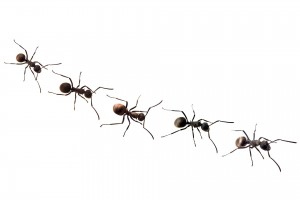 With all due respect to the hysteria surrounding the Ebola virus making its way to our shores, I am distracted of late by another crisis.
With all due respect to the hysteria surrounding the Ebola virus making its way to our shores, I am distracted of late by another crisis.
Tiny in comparison, but mighty in their ability to frustrate, I speak of my recent battle with ants.
As a kid, under the Christmas tree one year, Santa brought me a fancy wooden, double-paned ant farm. My brother and I would sit mesmerized watching the tenacity, strength and formidable determination the ants displayed as they built their labyrinth of tunnels. We thought ants were cool. Now, not so much.
With the unusually warm weather we’ve been enjoying, ant infestations are the glass-half-empty side of all this lovely sunshine. That’s because ants invade homes because of extreme heat, draught or rainy weather, not food.
It turns out that making themselves at home in our homes is not influenced by the use of pesticides or leaving food on the counter (though at our home the slightest crumb sounds the cry of the pheromone frenzied seeker ants).
Ants are simply escaping the heat or the dampness depending on the time of year and the severity of the weather conditions.
Stanford University conducted an 18-month study on the behavior of ants to find out why we experience ant infestations in the first place. Using bug spray, bait and other household pesticides to prevent ant invasions is futile, according to the study which was published in the journal American Midland Naturalist.
“People spend a lot of money on year-round pesticides,” says Deborah M. Gordon, associate professor of biological sciences at Stanford and lead author of the study, “but it’s not the pesticide that keeps ants out of your home, it’s the weather.”
Because we have a small dog and young grandchildren, I am not keen on using pesticides. But what to do? I did a little research and found some interesting ways to discourage the little buggers. Here are just a few in case you are experiencing our same dilemma:
- The best way to start is by caulking or putting Vaseline in any areas of the house where you find the ant trails emerging.
- Put Bay leaves dipped in mouthwash in the corners of your cupboards.
- Use equal parts of borax and sugar (or honey) melted to make a honey like solution. Leave it around the ants nest or trails in a shallow dish. This gets rid of the whole nest when they take it back and borax is harmless to other animals.
- Ants will crawl away from cinnamon, mint, red chili powder, and black pepper. All of them are inexpensive and can be sprinkled on countertops or cupboards, they’re not poisonous and highly effective. Baby powder is also a good deterrent.
- Set pet food dishes in a larger pan with a half inch of water and a little vinegar or detergent to keep ants from eating Fido’s chow.
Newly appointed Newport Beach Arts Commissioner, Lynn Selich, resides in Newport Beach. Reach her at Lynn@OCSocialScene.com.




